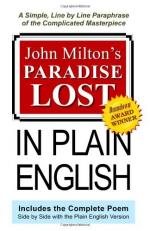|
This section contains 12,000 words (approx. 40 pages at 300 words per page) |

|
SOURCE: "Great Acts and Great Eloquence: The Historical Imagination in the Later Revolutionary Prose," in Milton and the Drama of History: Historical Vision, Iconoclasm, and the Literary Imagination, Cambridge University Press, 1974, pp. 74-91.
In the following essay, Lowenstein examines tension in Milton's later revolutionary writings. The critic suggests that, in serving both historiographic and mythopoeic functions, Milton understood the need for a poet to be true to historical fact while also fulfilling artistic and creative criteria.
Milton's self-consciousness about the drama of national historic destiny remains central to his later revolutionary prose works. Though they may seem diverse in context and purpose, the Defenses, the History of Britain, and the late pre-Restoration tracts are often mythopoetic in their presentation of and response to history. Milton's imaginative response, however, becomes problematic when he faces the dilemma of mediating between invention and truth in the History of Britain: investigating his...
|
This section contains 12,000 words (approx. 40 pages at 300 words per page) |

|


